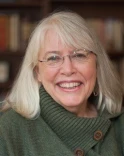Minnie Lou Peterson had dreams. But growing up in a small town in racially segregated North Carolina in the 1920s and 1930s meant that obstacles sat in her path at every turn. Like many Black children of her era, she was denied educational opportunities—dashing one of her biggest aspirations. Her family eventually moved north to Washington, D.C., as part of the Great Migration but, even there, Minnie Lou Peterson’s husband opposed her plan to go to school to become a beautician. He insisted that she stay home to care for their young daughter.
She never achieved the education and career she wanted, but it didn’t stop her from championing the transformational power of education, especially for women. Her commitment underpins the Minnie L. Peterson Memorial Scholarship, which recently received additional funding from a significant estate gift from UMGC alumnae Clarissa Peterson and her husband Edward Archer.
The scholarship is open annually to a UMGC graduate or undergraduate student majoring in a science, technology, engineering or math (STEM) field. Students in the business program are also eligible to apply. The fund was set up in late 2006, just after Minnie Lou Peterson’s death. Its first scholarship recipient was named in 2008. The new funding will increase the number of scholarships available.
“Education’s power to transform lives can never be understated, and people like Minnie Peterson recognized that,” said UMGC President Gregory Fowler. “It is heartbreaking that Mrs. Peterson was denied her dreams, but it is also wonderful that her belief in lifelong learning has inspired important opportunities for future generations.”
Peterson recalled how her mother, who only had a 7th grade education, often asked her daughter to read to her.
“She always wanted an education. She always wanted to learn,” said Peterson. “I remember when I was a teenager, seeing my mother cry because she wasn’t allowed to go to school. It made me determined to get an education and empower myself.
“Through this scholarship bearing my mother’s name, her passion and her legacy are being passed forward to empower others to realize their dreams,” she added.
Peterson enrolled at UMGC and studied at night while working three jobs. A $500 scholarship from the university helped. But she saw how financial and family obligations meant some students in her classes struggled to pursue their educations, a reminder of what her mother faced. Many of those students were women.
“I saw single parents. I saw older women trying to get their degrees,” she said.
Peterson recalled the pivotal role one of those older women played during an overwhelming moment in a computer programming course. Peterson could not get a basic code to work—and she needed the class to get her degree.
“It was my last class, it was a Sunday afternoon, and the assignment was due,” Peterson said. “I had to be at work the next morning, and I was trying not to cry. I was sitting in the lab with an older woman and she asked if I was OK. I started to weep, telling her I couldn’t get the code to work and I needed to graduate.
“She told me her story. She had five kids and she was a homemaker and she made sure all her children graduated from college,” Peterson continued. “She had promised herself that one day she would do the same. And she told me not to worry about how long it takes, but to just do it for myself.”
That moment was when Peterson, now president and CEO of human resources consultancy firm Ohana HR, decided to honor her mother, whom she described “as a very giving person who always wanted to lift people up.” Peterson said her own life and her career, which carried her around the world and across a number of companies and nonprofits, including work with the Obama Foundation, “have been about making a difference.”
Peterson hopes her mother’s story will inspire others to contribute to scholarship funding at UMGC, but her primarily goal in memorializing her mother was to show that “Minnie Peterson wasn’t just a name. She had a story and, if she were alive, she would be proud that someone received a scholarship in her name to help them on their journey. This scholarship is about Minnie’s legacy.”
Peterson also noted that her mother wasn’t the only woman in her family who valued the power of education, even if she, too, was denied access to it.
“My grandmother was 109 when she died. Toward the end of her life, she could no longer see but she recognized voices. I remember going with my mother and my uncle to visit her at a nursing home. I was in my late 20s at the time,” Peterson said. “My Grandma Annie was illiterate, but the first thing she said when I walked in is, ‘Baby, are you still going to school? You must always continue to learn.’”

Share This